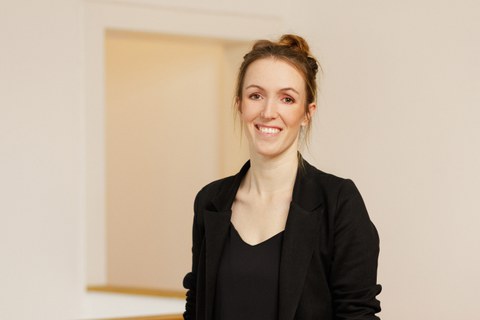Selina Schulze-Spüntrup
Table of contents
- 1. What is the title of your dissertation? How did you come up with the idea of dealing with this topic for your doctorate?
- 2. What are the central research questions you are asking yourself in your dissertation and what methods are you using to try and answer these questions?
- 3. What do you think are the most exciting results of your research so far?
- 4. You are a Research Associate at the ifo Institute in Dresden and are therefore doing your doctorate externally. What experiences have you had with this doctoral model?
Selina Schulze-Spüntrup has been a research associate at the Dresden branch of the ifo Institute since March 2022. She is doing her doctorate externally at the Chair of Economics, in particular Public Economics, under Prof. Dr. Marcel Thum.
1. What is the title of your dissertation? How did you come up with the idea of dealing with this topic for your doctorate?
The title of my dissertation is "Three Essays in Health Economics", and it was clear from the outset that I wanted to focus on organ donation. The reason for this was that a very close childhood friend suddenly became so ill that she urgently needed a new organ. This gave me great motivation to think about what I could do myself to tackle the problem of too few donated organs.
2. What are the central research questions you are asking yourself in your dissertation and what methods are you using to try and answer these questions?
How can organ donation rates be increased? When you look at this important question, the first thing that comes to mind is the discussion about the contradictory solution. That's why I first wanted to find out whether a switch from the consent solution to the objection solution would actually lead to more organ donors. Using the so-called "synthetic control method", for example, I estimate how organ donation rates would have developed in countries that have introduced the objection solution if they had remained with the consent solution.
However, my research also focuses on other measures such as the maintenance of a register in which donation decisions are recorded centrally or the targeted manner in which public authorities survey willingness to donate organs. To investigate the effects on organ donation rates, I use modern empirical methods that allow comparisons to be made between affected and non-affected regions before and after an intervention.
3. What do you think are the most exciting results of your research so far?
In the public debate, arguments are repeatedly put forward that the opt-out solution is not effective. However, I can show that two countries that have actually made this change have been very successful with it.
4. You are a Research Associate at the ifo Institute in Dresden and are therefore doing your doctorate externally. What experiences have you had with this doctoral model?
I like the fact that we are a large team of doctoral students at ifo and at the same time the networking and exchange with colleagues from TU Dresden works very well.

